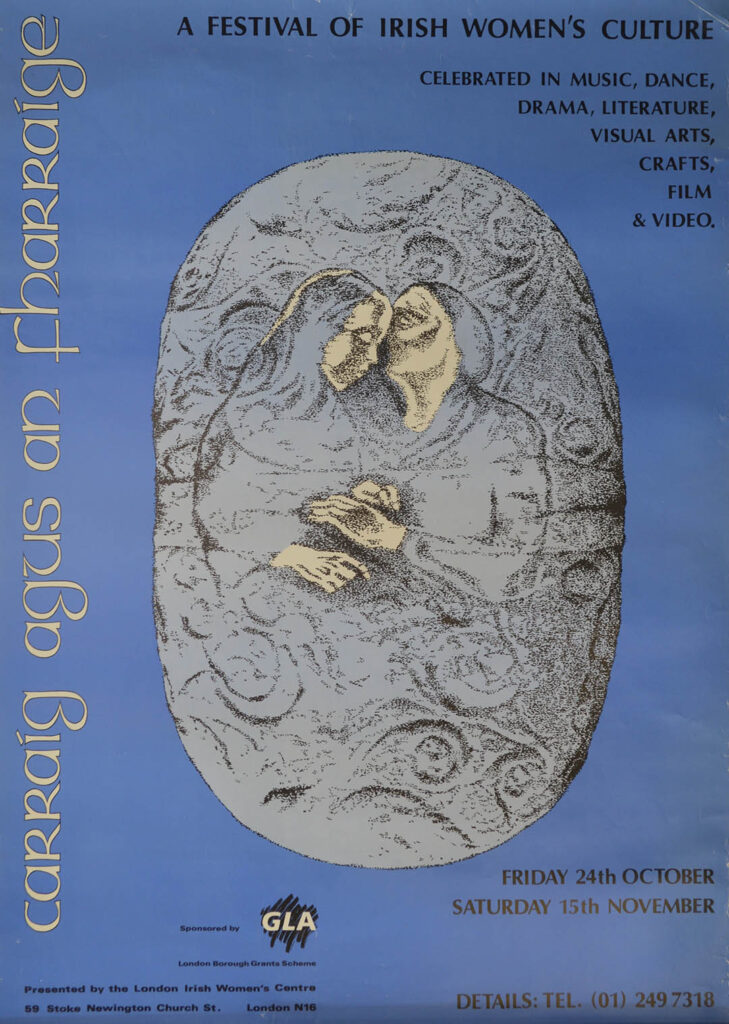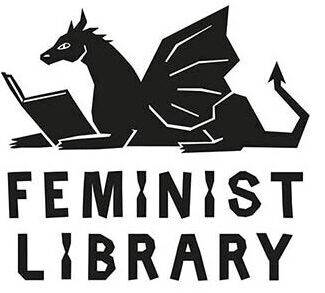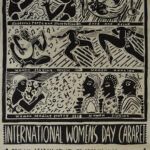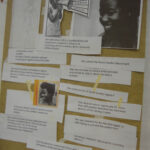Text by Jennifer Brough
‹ Return to Text by Jennifer Brough

The rock and the sea
Three women stand on the rock in the sea. They clasp each other’s hands against the ocean’s roar. They need not look to know that behind them stands a bigger beast whose silent cry is insidious.
Its tendrils crept into churches and town halls, sprouted in the ground reaching up into televisions and books. It spawned, uninterrupted, for years. The beast grows in patches of fungi across the land, expelling its spores to infect the blood. It blooms in the body if the host is right. Its rot is expelled through mouths and hands. And with it comes power.
The women saw its danger, saw the changes for what they were. The fungi, congealed over time, became laws that scraped away at their flesh and minds. They fought with their friends at first, using their bodies as barricades. Women have always been able to shape-shift. When the time came, they became hills, wolves, trees, and crows. They were once part of the fertile land that was slowly poisoned.
The beast found their power threatening in its slipperiness and puppeted the powerful to deem them unnatural. A litany of misdemeanours was nailed to their door. They were threatened with dungeons and brutality. So they gathered what they could and decided to leave for good. These three women would be the first, but they knew their sisters would come in droves. If they made it.
Hope is a verb that sustains, one that feels like warm bread in the stomach. With the taste of tomorrow on their lips, the three as one Morrígan turn to each other and nod. The changing. It starts with an itch in the blood. A tingling along the nerves. Limbs transform in swirls of purple smoke. The taste of cinders. Under the moon, their bodies burst into a murder of crows and take flight.
Away from the rock in the sea. Willing exiles from their island. The land tries to tug them back but the promise of elsewhere fuels their flight. An elsewhere, the seedling of beginning nurtured by gentle hands. Another rock in the same sea where things could be —
And so they landed, returned to their shape as three and began building. With steady, slow hands they form teagh na mBan, the women’s house. A place to shake off the rot. They check the walls each night to check no spores can creep through the cracks. Each knock at the door a held breath until familiar faces peers through.
For a time, it was good. But soon the scales fell from their shape-shifting eyes and saw the breed of tendrils sprouting from this rock. Just as thick and grasping, with more bodies to malign.
This is not the first battle they had seen, nor would it be the last. The Morrígan was made a war goddess by myth, but her strength is pluralised through new ties. The warriors fortify her and she, in turn, them. They stand firm. Here, they would keep fighting. Together.
The London Irish Women’s Centre was a feminist collective established in 1983 at 59 Stoke Newington Church Street.
Founded by Irish women who arrived in London to escape the repressive and dominant Catholic culture of Ireland in the 1980s, the London Centre acted as a political and social hub for comradery until its close in 2012.
The women organised advice on how to access essential services as well as campaigning on issues such as housing, employment, anti-racism, and equality. Many of the women sought to live alternative lives beyond the nuclear family and limited roles for women in Ireland. Several women were feminists and lesbians looking to live freely with their loved ones in a more equitable society.
The Centre was also an important space to celebrate Irish culture. This poster from 1986 is an example of the festivities the Centre organised throughout the year, featuring music, dance, and drama by Irish women. The Irish words, carraig agus an fharraige, translate to ‘rock and the sea’. While the events were also open to non-Irish women, the Centre was a place to reclaim and remember Irish heritage through readings, performances, and skill-sharing.
The Centre’s legacy was documented by Michelle Deignan in Breaking Ground: The Story of the London Irish Women’s Centre.
Bio
Jennifer Brough (she/they) is a workshop facilitator and slow writer based in Nottingham. She writes fiction, reviews, and personal essays exploring the body, gender, pain, art and literature. She is working on an essay collection and a poetry pamphlet. Jennifer is involved in projects centred in disability/illness and feminism, and is a founding member of resting up collective, an interdisciplinary sick group of artists.
Tweets by Jennifer_Brough
https://www.instagram.com/restingupcollective_


